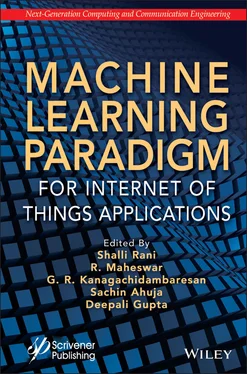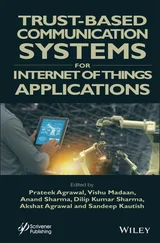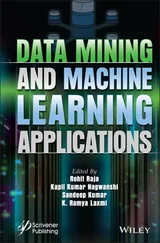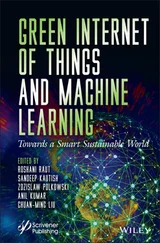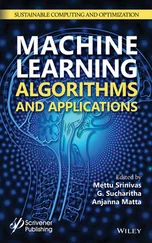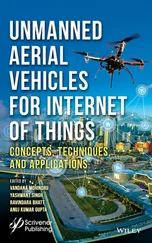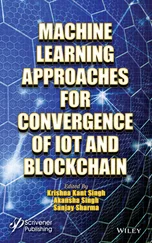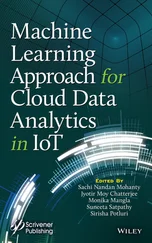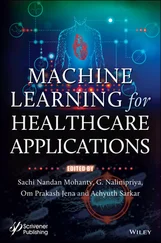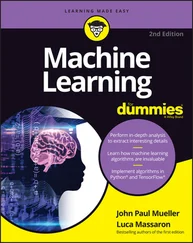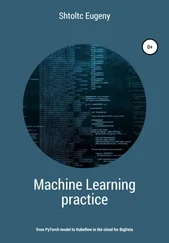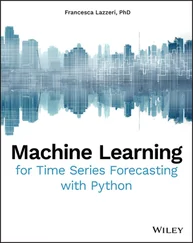Limit of Liability/Disclaimer of Warranty
While the publisher and authors have used their best efforts in preparing this work, they make no representations or warranties with respect to the accuracy or completeness of the contents of this work and specifically disclaim all warranties, including without limitation any implied warranties of merchantability or fitness for a particular purpose. No warranty may be created or extended by sales representatives, written sales materials, or promotional statements for this work. The fact that an organization, website, or product is referred to in this work as a citation and/or potential source of further information does not mean that the publisher and authors endorse the information or services the organization, website, or product may provide or recommendations it may make. This work is sold with the understanding that the publisher is not engaged in rendering professional services. The advice and strategies contained herein may not be suitable for your situation. You should consult with a specialist where appropriate. Neither the publisher nor authors shall be liable for any loss of profit or any other commercial damages, including but not limited to special, incidental, consequential, or other damages. Further, readers should be aware that websites listed in this work may have changed or disappeared between when this work was written and when it is read.
Library of Congress Cataloging-in-Publication Data
ISBN 978-1-119-76047-4
Cover image: Pixabay.Com
Cover design by Russell Richardson
Set in size of 11pt and Minion Pro by Manila Typesetting Company, Makati, Philippines
Printed in the USA
10 9 8 7 6 5 4 3 2 1
Machine learning (ML) is the key tool for fast processing and decision-making applied to smart city applications and next-generation IoT devices, which require ML to satisfy their working objective. Machine learning has become a common subject to all people like engineers, doctors, pharmacy companies and business people. The book addresses the problem and new algorithms, their accuracy and fitness ratio for existing real-time problems. Tapping into that data to extract useful information is a challenge that’s starting to be met using the pattern-matching abilities of ML, which is a subset of the field of artificial intelligence (AI). In order to provide a smarter environment, there needs to be implemented IoT devices with machine learning. Machine learning will allow these smart devices to be smarter in a literal sense. They can analyze the data generated by the connected devices and get an insight into human behavioral patterns. Hence, it would not be wrong to say that if the IoT is the digital nervous system, then ML acts as its medulla oblongata. Without implementing ML, it would really be difficult for smart devices and the IoT to make smart decisions in real-time, severely limiting their capabilities. This book provides the challenges and the solution in these areas.
This book provides the state-of-the-art applications of Machine Learning in IoT environment. The most common use cases for machine learning and IoT data are predictive maintenance, followed by analyzing CCTV surveillance, smart home applications, smart-healthcare, in-store ‘contextualized marketing’ and intelligent transportation systems. Readers will gain an insight into the integration of Machine Learning with IoT in various application domains.
Lastly, we would like to thanks all the authors who contributed whole heartedly in bringing their ideas and research in the form of chapters.
Shalli Rani R. Maheswar G. R. KanagachidambaresanSachin AhujaDeepali Gupta January 2022
1
Machine Learning Concept–Based IoT Platforms for Smart Cities’ Implementation and Requirements
M. Saravanan1*, J. Ajayan2, R. Maheswar3, Eswaran Parthasarathy4 and K. Sumathi5
1 Sri Eshwar College of Engineering, Coimbatore, Tamilnadu, India
2 SR University Warangal, Telangana, India
3 School of EEE, VIT Bhopal University, Bhopal, India
4 SRM Institute of Science and Technology, Chennai, India
5 Sri Krishna College of Technology, Coimbatore, India
Abstract
In developing countries, smart cities are a challenge due to the exponential rise in population. With the rise in demand and availability for goods and facilities, it is now one of the world's most dynamic networks. Intelligent machines are crucial in the construction of critical infrastructure and smart cities in this new age. The increase in population has created new opportunities for smart city management and administration. In the smart city model, information and communication technology (ICT) plays a vital role in policy formulation, decision-making, implementation, and, finally, effective resource allocation. The study's key objective is to explore the role of artificial intelligence, machine learning, and deep reinforcement learning in the evolution of cities. Rapid advancements in computing and hardware, as well as high-speed internet connectivity, have enabled large amounts of data to be transmitted into the physical world.
Keywords: Smart city, process management, sewage treatment plan (STP), neural networks, control centers, cloud storage
The idea of smart cities is the concept applied to the programs that uses the digital and the ICT-based innovation to increase the urban infrastructure quality and create the new economic and the prospect in the cities, and more is focused in the need of gaining the cost of the smart cities that are the distributed through all sectors with in the society emergence of the smart city projects around the world, such as analyzing the distributional impact of the individuals of the earth and the locations. The concept of smart city in the technical manner which will lead to debate the smart city varies across the countries according to the geopolitics; it implies more advanced and the necessary need to develop the city to both economically stable and more pollution-free concept. Initiatives that use the digital innovation with properly document are commitment of smart cities to enhancing the people’s lives while providing the sectoral and the multi-sectoral solutions to some of the most common urban challenges; stack-holders’ involvement in the local government and the strategic collaborations to improve the public engagement is maximized in private sectors positions in decision-making, and other benefits of the public access experimentation on open data with the interstate connectivity combined with the public and private people collaboration. Different regions of the world managed to establish their own smart city architecture in different manners also with approach of same belief [1]. The operable concept is complex for new setup process of the related to the increase in population to contribute in the development of technology with the social and political and the economy growth. The data that generated smart city concept are included in the networking application to monitor the application of various constrains like water monitoring and environment monitoring. Urban local bodies in particular for management service providers would be a crucial factor in evaluating the progress of smart cities mainly in India. Implementation approach will be consulted with pervious established architecture already present in various region of the globe. The well-developed cities like Singapore and Dubai UAE have the well-integrated business models, and the creative local collaborations will resolve the problems to get faced in India in nearly future [1]. In order to manage the data intelligently, IoT requires data to either represent improved customer services or optimize the effectiveness of the IoT system. In this way, applications should be able to access raw data across the network from different resources and evaluate this data to extract information.
Читать дальше
